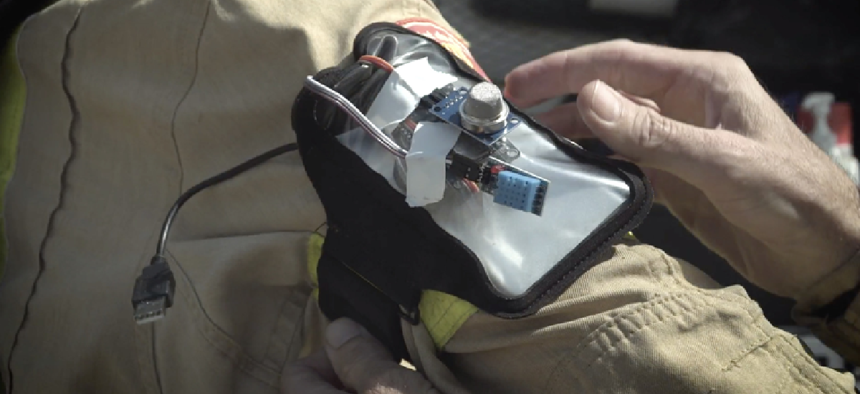Hackathons and challenges drum up creative solutions for responders


Connecting state and local government leaders
Crowdsourcing is delivering creative technology solutions to the responder community thanks to challenges from IBM, AT&T FirstNet and the National Institute of Standards and Technology.
*** IBM's Call for Code 2019 Global Challenge sought solutions to help mitigate the impacts of natural disasters and enable first responders to better support survivors.
The winning project, Prometeo, was submitted by a Spanish team that included a nurse, a firefighter and software developers. The team created a combination hardware-software solution. The smartphone-sized wearable device that straps to responders' arms carries sensors that measure environmental factors such as temperature, humidity and smoke concentration and send the data to IBM's Cloud IoT platform. The data is then passed to a Watson-based machine learning model, which analyses the information and translates it into color-coded status alerts that fire command centers can use to monitor the health of each deployed firefighter in real-time.
More than 180,000 individuals from 165 nations participated this year's challenge, according to IBM. Participants included independent and enterprise developers, data scientists, activists and students who used data from The Weather Company and IBM Cloud, Watson and IBM Blockchain to create more than 5,000 applications to help prepare for and mitigate the impact of natural disasters.
Second place was awarded to Sparrow, an open source conversational AI platform that helps users address their physical and psychological well-being during and after natural disasters by matching them with automated support and live experts. Third place awarded to Rove, an SMS chatbot that uses natural language understanding to give users health information during a natural disaster.
Last year's winning solution, Project Owl, recently completed a field tests in areas of Puerto Rico that are still recovering from the devastation of Hurricane Maria.
*** At the fourth annual AT&T FirstNet Public Safety Hackathon, participants were challenged to develop mobile apps to improve communications in the first responder community.
One group of students addressed speeding response to opioid overdoses with an app that quickly connects community members with nearby suppliers of Narcan, a drug that counteracts overdoses. The app potentially could summon help faster than calling 911 and waiting for an ambulance.
“Basically all you would have to do is push a button on a screen if you or someone you know is overdosing. It immediately contacts surrounding community members and first responders who will receive the location of where the report was sent,” one of the students told the South Bend Tribune.
The app won first place in “Best App for the Opioid Crisis” and second place in the “Best App from a Student Team” categories, earning the students $7,000 in prize money.
*** The National Institute of Standards and Technology's Tech to Protect Challenge has finished its first set of regional coding contests designed to create technologies of the future for public safety communications. Teams in four cities -- Washington D.C., Chicago, Denver and College Station, Texas -- spent three days coding to solve public safety challenges from a diverse set of 10 contest technical areas. See the list of winners here.
The program is offering more than $2 million in prizes to improve centralized mobile dashboards, GIS mapping of LTE coverage areas, augmented reality applications, enhanced digital security and tracking of responder and patient health. The federally funded program is led by the NIST's Public Safety Communications Research Division.
The next set of events will be held Nov. 1-3 in six major cities.





